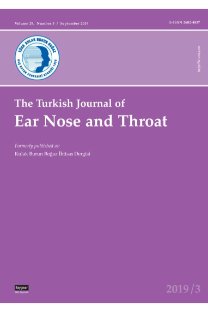Tiroit oftalmopatisinde transantral ve endoskopik transnazal yolla orbital dekompresyon
Dekompresyon, cerrahi/yöntem, endoskopi, eksoftalmos/cerrahi, Graves hastalığı/cerrahi/radyografi, nazalkavite, oküler motilite bozuklukları/etyoloji, okülomotor kasları, orbit/cerrahi, bilgisayarlı tomografi, tedavi sonucu, görme bozuklukları/cerrahi, görme keskinliği
Orbital decompression by endoscopic transnasal and transantral approach in thyroid-associated ophthalmopathy
Decompression surgical/methods, endoscopy, exophthalmos/surgery, Graves' disease/surgery/radiography, nasal cavity, ocular motility disorders/etiology, oculomotor muscles, orbit/surgery, tomography, X-ray computed, treatment outcome, Vision disorders/surgery, visual acuity,
___
- Calcaterra TC, Trapp TK. Unilateral pro p t o s i s . Otolaryngol Clin North Am 1988;21:53-63.
- Pratt MF, Khetia PA. Combined endoscopic transnasal and transantral orbital decompression. Am J Otolaryngol 1 9 9 7 ; 1 8 : 1 5 9 - 6 4 .
- Kennedy DW, Goodstein ML, Miller NR, Zinreich SJ. Endoscopic transnasal orbital decompression. Arch Otolaryngol Head Neck Surg 1990;116:275-82.
- İleri F, Ünal M, Köybaflıoğlu A, Yılmazbafl P, Yılmaz M. Tiroid oftalmopatide kombine orbita dekompres- yon tekniği. In: Kaytaz A, editor. 24. Ulusal Türk Oto- rinolarengoloji Bafl-Boyun Cerrahisi Kongresi Kitabı; 23-27 Eylül 1997; Antalya, Türkiye; s. 467-70.
- Gorman CA, Garrity JA, Fatourechi V, Bahn RS, Petersen IA, Staff o rd SL, et al. A prospective, randomized, double- blind, placebo-controlled study of orbital radiotherapy for Graves’ ophthalmopathy. Ophthalmology 2001;108: 1 5 2 3 - 3 4 .
- De Ponte FS, Bottini DJ, Brunelli A, Marchetti E, Iannetti G. New approach to the surgical treatment of severe exophthalmos in Graves disease. J Craniofac Surg 1998;9:394-9.
- Etaner R, Değer K, Aktan C, Orhan Y. Malign eksoftal- mi (Graves hastalığı) ve orbital dekompresyon. Türk Otolarengoloji Arflivi 1982;20:55-61.
- F a t o u rechi V, Garrity JA, Bartley GB, Bergstralh EJ, DeSanto LW, Gorman CA. Graves ophthalmopathy. Results of transantral orbital decompression performed primarily for cosmetic indications. Ophthalmology 1994; 1 0 1 : 9 3 8 - 4 2 .
- Tallstedt L, Papatziamos G, Lundblad L, Anggard A. Results of transantral orbital decompression in patients with thyroid-associated ophthalmopathy. Acta Ophthalmol Scand 2000;78:206-10.
- Kikkawa DO, Pornpanich K, Cruz RC Jr, Levi L, Granet DB. Graded orbital decompression based on severity of p roptosis. Ophthalmology 2002;109:1219-24.
- Neugebauer A, Nishino K, Neugebauer P, Konen W, Michel O. Effects of bilateral orbital decompression by an endoscopic endonasal approach in dysthyro i d orbitopathy. Br J Ophthalmol 1996;80:58-62.
- L i n b e rg JV, Anderson RL. Transorbital decompre s- sion. Indications and results. Arch Ophthalmol 1981; 9 9 : 11 3 - 9 .
- Fells P. Orbital decompression for severe dysthyroid eye disease. Br J Ophthalmol 1987;71:107-11.
- Nunery WR, Nunery CW, Martin RT, Truong TV, Osborn DR. The risk of diplopia following orbital floor and medial wall decompression in subtypes of oph- thalmic Graves' disease. Ophthal Plast Reconstr Surg 1 9 9 7;13:153-60.
- McCord CD Jr, Putnam JR, Ugland DN. Pressure-vol- ume orbital measurement comparing decompression approaches. Ophthal Plast Reconstr Surg 1985;1:55-63.
- Graham SM, Carter KD. Combined endoscopic and sub- ciliary orbital decompression for thyro i d - related com- p ressive optic neuro p a t h y. Rhinology 1997;35:103-7.
- Petersen IA, Donaldson SS, Kriss JP. Orbital radiother- apy: the Stanford experience. In: Wall JR, editor. Graves’s ophthalmopathy. 1st ed. Oxford: Blackwell; 1990. p. 135-44.
- Eker L, Cambazoğlu E, Özpaçacı T, Börümcek E. En- doskopik orbital dekompresyon. Türk Otolarengoloji Arflivi 1997;35:29-32.
- ISSN: 2602-4837
- Yayın Aralığı: Yılda 4 Sayı
- Başlangıç: 1991
- Yayıncı: İstanbul Üniversitesi
Medikal tedavinin başarısız olduğu ani işitme kayıplı olgularda hiperbarik oksijen tedavisi
Ender İNCİ, Ferhat ERİŞİR, Mehmet ADA, Özcan ÖZTÜRK, Ender GÜÇLÜ, Fatih ÖKTEM, Murat TOPRAK
Hava yolu içeren ve içermeyen burun tamponlarının uyku sırasında arteryel kan gazları üzerine etkisi
Özgür YİĞİT, Uğur ÇINAR, Berna USLU COŞKUN, Gökhan AKGÜL, Ebru TOPUZ, Burhan DADAŞ
Hipofarenks ve servikal özofagus kanserlerinde gastrik pull-up
E. Evrim ÜNSAL, Şafak DAĞLI, Osman ARIKAN, Cafer ÖZDEM
Sinan KOCATÜRK, Gökhan KURAN, Selma KURUKAHVECİOĞLU, Ünsal ERKAM
Tiroit oftalmopatisinde transantral ve endoskopik transnazal yolla orbital dekompresyon
Harun CANSIZ, Kemal TUSKAN, Nuran KALEKOĞLU, Özcan ÖZTÜRK, Ender İNCİ, Nihat ŞEKERCİOĞLU, Halit PAZARLI
Koklear implantasyonlu hastalarda işitme performanslarının karşılaştırılması
Emre YÜCEL, Meryem Nesil KELEŞ TÜREL, Mehmet Ali SOLMAZ, Kemal DEĞER, Ayşen ERDİL
